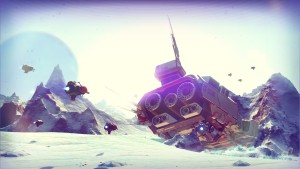(This column is posted at www.StevenSavage.com, www.SeventhSanctum.com, and Steve’s Tumblr)
I’m looking forward to No Man’s Sky – which is apparent if you see my Twitter, Facebook, blogs, or just talk to me. The procedural space adventure fascinates me as it pushes all my buttons – and of course I’m big on procedural generation, so of course I’m following it.
Acknowledging this, this is fair warning you’re gonna see some No Man’s Sky posts. It’s relevant to my interests, to what I do here, so I hope they’e informative and interesting.
As I’ve scanned internet posts and Steam communities, one useful insight I’ve seen is that the game may face an issue of being “a mile wide and an inch deep.” A game, in short, of great breadth but not a lot of depth. I think this concern is worth addressing, as it reveals some truths about games, procedural games, and their development.
The concern is one I feel is legitimate for some in the audience. NMS’ videos make it clear that the game presents an enormous Sandbox galaxy, with straightforward systems of crafting, exploring, fighting, trading, and reputation-building. This may be enough for many (such as myself), and certainly enough for a broad, wide adventure – but it may not be enough for everyone attracted to the premise.
The “mile wide” may stand for people, but for some people the game may not have the depth they want – or the kind of depth they want. You won’t be building structures, negotiating trade agreements, or going on elaborate story quests – hallmarks of other games and science fiction. For some NMS will have everything they want – for others it’ll be a beautiful galaxy that might not have what they want, or enough of it.
I analyze what I see from NMS’s designers and ads, because watching this dream game evolve has taught me a lot about games and procedural generation. The concern about NMS not having the depth some one made me ask, simply, what if the game tried to add more?
It’s not hard to imagine adding some more classic science fiction elements from the novels that inspired it. Take the simple alien language engine and add some negotiation and trade deals. Allow some encounters to spawn some quests – like smuggling something thorough a blockade. Maybe even a bit of building or improving buildings. Just a bit more maybe . . .
. . . and this is where it gets complicated.
First, even if there is a desire to add “more” we’re talking a game with a setting the size of a galaxy, filled with procedural content so large the devs had to make in-game probes to study the worlds. Any addition of new features could produce development nightmares, adding them onto an already careully developed and tweaked engine.
Second, the developers would have to choose what new features to add to their already polished set. What would sell? What do people want? S much work is procedural, so much unknown, can the devs predict what people will want? Will they be able to balance demands? They can’t be sure how people will react to the game – potential pirates may become explorers, traders decide to cut out the middlemen and become pirates, and explorers may drop their archiving duties to just swap rare minerals for cash. Throwing in more features requires careful consideration of how the audience will reacts.
Third, if the new items could be added, then comes the question of testing. Adding new features onto procedural content produce a new nightmare of testing it and making sure nothing else broke and all the pieces work together. That “mile wide” part means a lot more testing work when you try to make that “inch” a bit deeper.
Fourth and finally the extreme “width” of the game means that, with too much “depth” the game might become a muddle of choices and options. NMS may give you the stars, but its focus on being a kind of space exploration/survival game provides useful boundaries for play. Throw in a few more features and a game that already provides little direction could end up a muddle.
Those concerned about depth have a legitimate concern – for some of the audience (again, I think most people buying NMS who are informed will know what they’re getting). But I think the creators have a sweet spot of features for this grand enterprise, and changing beyond that is fraught with dangr.
Is it the right choice? Well, we find out in June 2016 . . .
– Steve

